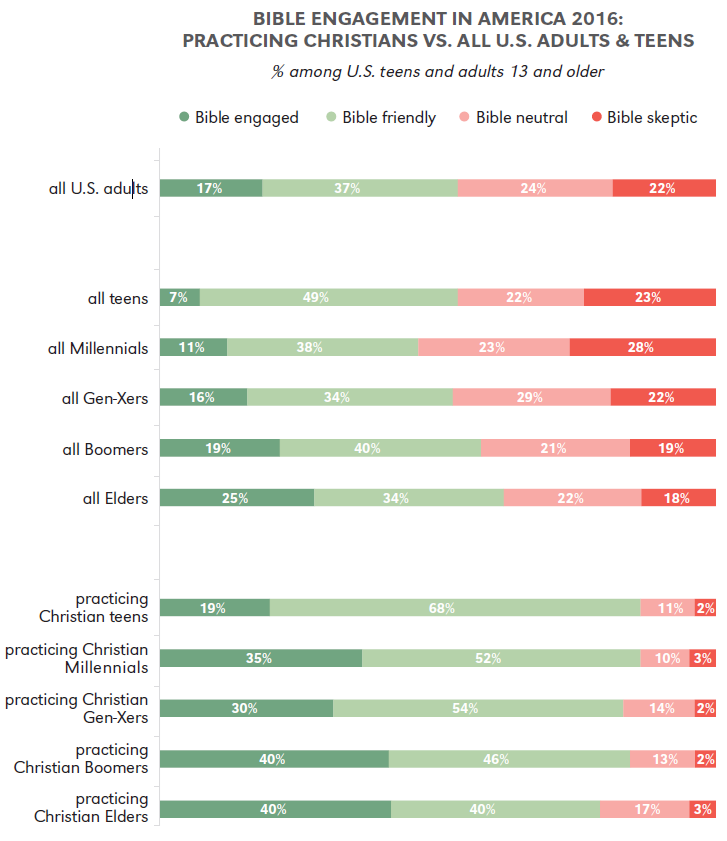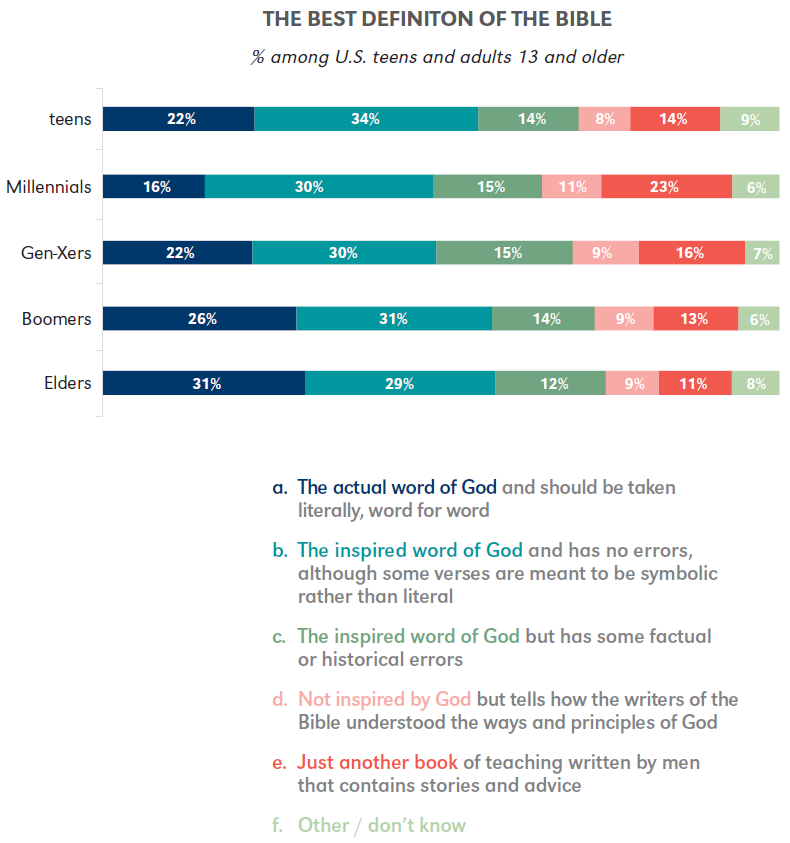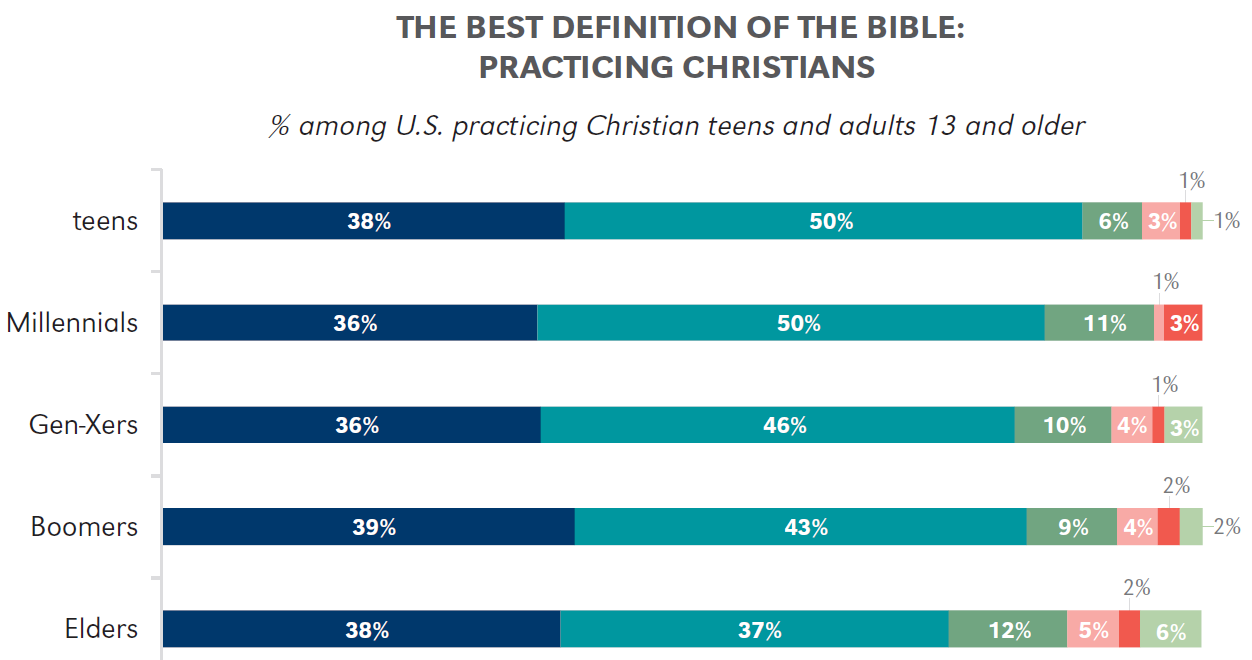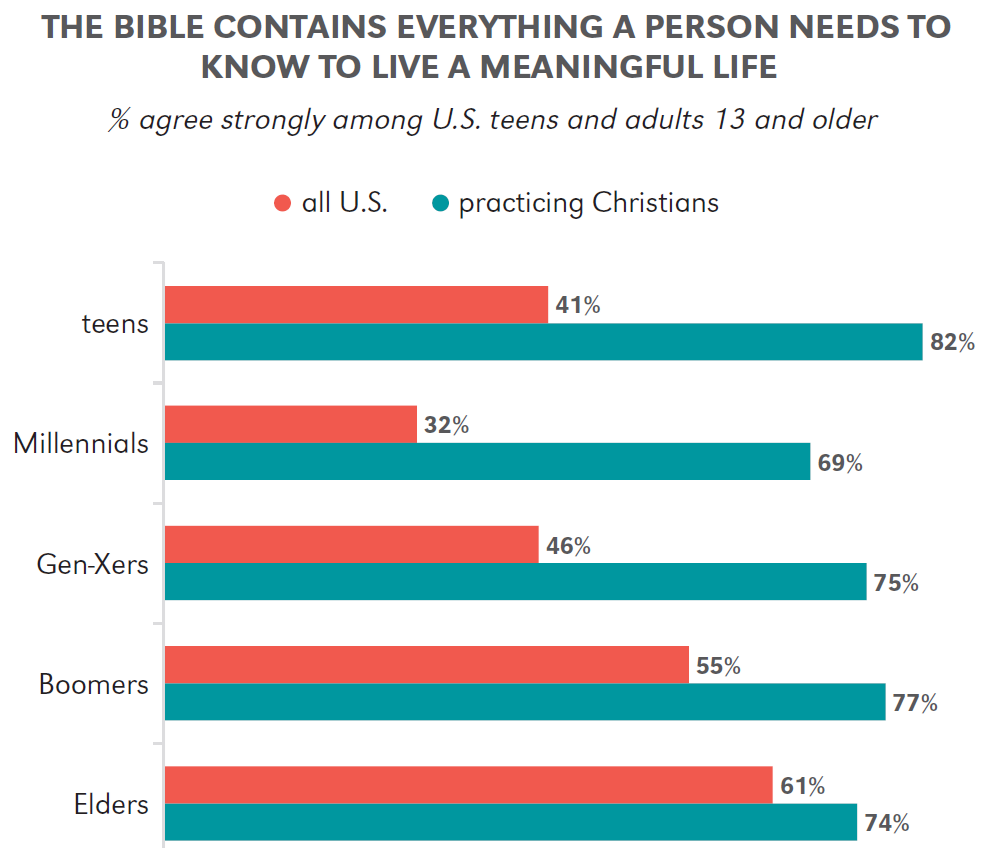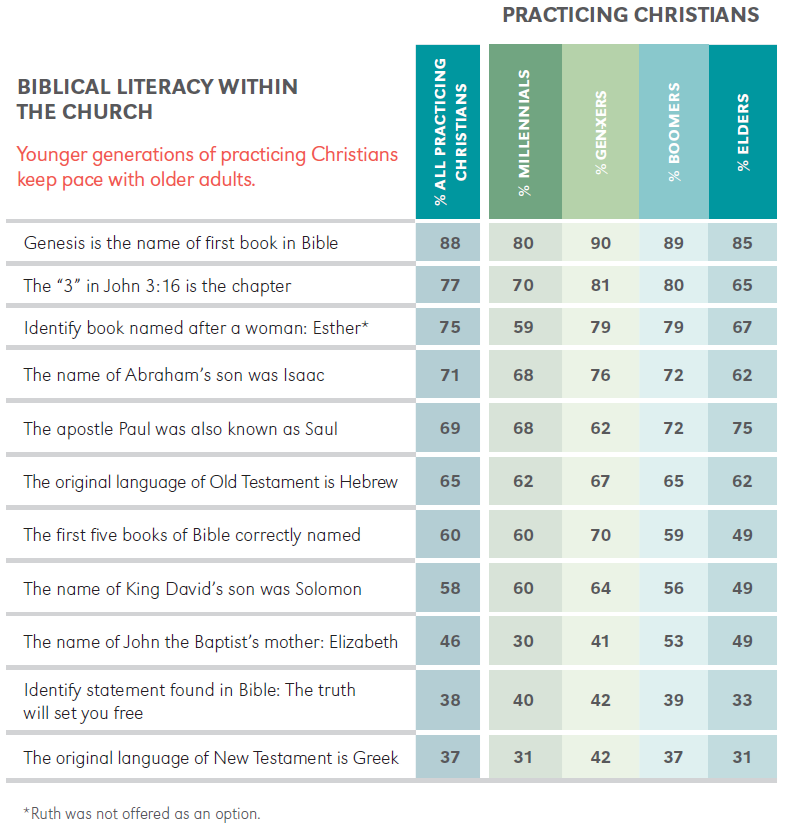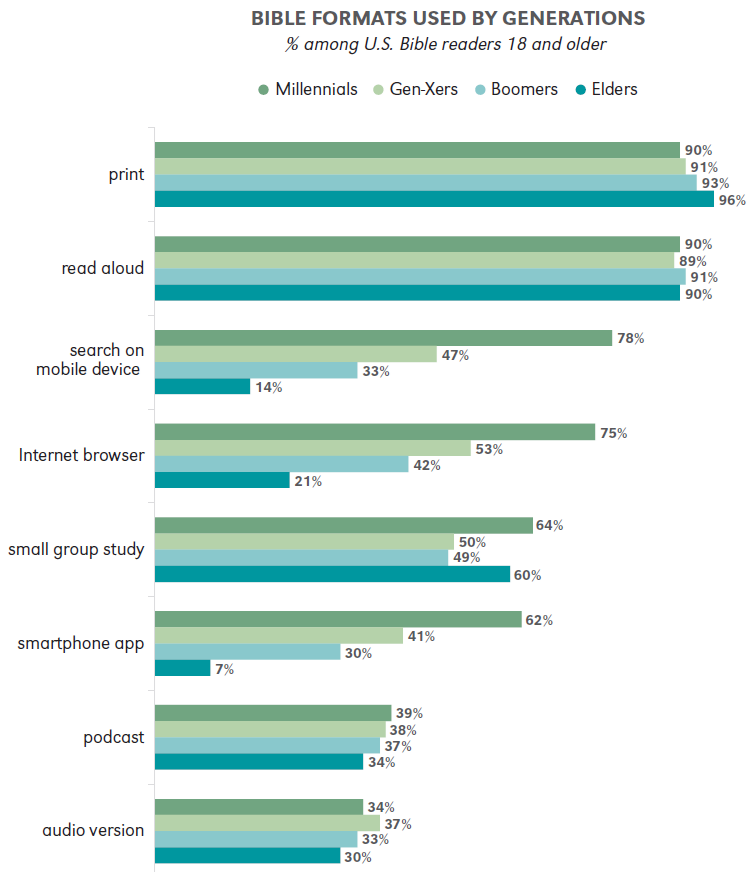Practicing Christian millennials are bucking a trend.
Overall, this generation is less likely to read or trust the Bible than any other. More than half (55%) are “Bible-neutral” or “Bible-skeptical,” compared to 45 percent of teens, 51 percent of Gen-Xers, 40 percent of boomers, and 40 percent of elders.
Yet Christian youth who go to church and care about their faith may know the Bible better than older Christians. Practicing millennials are more likely to believe the Bible came from God and read it multiple times a week than any other generation (87%), according to a six-year American Bible Society (ABS) and Barna Group study of Bible engagement in the United States.
(The report surveyed millennials, which it defined as those born between 1984 and 1998. gen-Xers were born between 1965 and 1983, boomers were born from 1946 to 1964, and elders were born before 1946. Teens were those ages 13 to 17 in 2015. Practicing describes those who identify as Christian, say their faith is important in their lives, and have been to church within the past month.)
In fact, the way practicing Christian millennials engage with the Bible looks a lot like the way their parents and grandparents do.
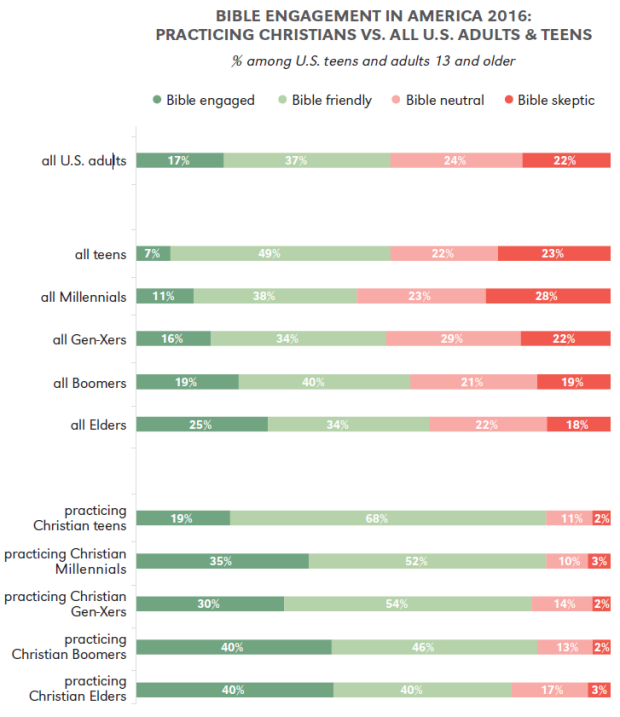
Americans of all ages are growing more skeptical about the Bible, according to the study. More than 1 in 5 (22%) said they were skeptical of the Bible’s claims in 2016, more than double the 10 percent who were skeptical in 2011.
While three-quarters of Americans believe that Jesus literally rose from the dead (a finding ABS and Barna call “remarkable”), fewer believe that a historical Daniel survived the lions’ den (65%), that Moses actually parted the Red Sea (64%), or that David literally killed Goliath with his slingshot (63%).
Millennials are the most skeptical of all. Overall, four of five adults consider the Bible a holy book (81%), and that number shrinks with age. Elders (88%) and boomers (87%) are more likely than gen-Xers (79%) and millennials (71%) to believe the Bible is holy.
The biggest gap appears between millennials and their grandparents. Millennials are twice as likely (23%) as elders (11%) to say the Bible is “just another book of teachings written by men.” Elders, meanwhile, are twice as likely (31%) as millennials (16%) to say the Bible is the actual word of God.
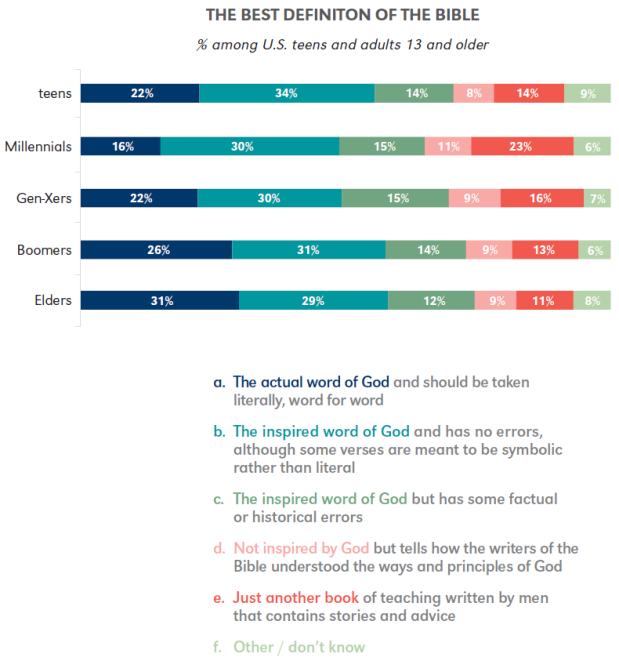
Millennials who are practicing Christians, however, look more like their grandparents than their peers.
Though fewer teens (20%) and millennials (14%) than all adults over 18 (25%) are practicing Protestants, all three groups share a similar approach to Scripture. Nine out of 10 in each group say the Bible is either the literal or inspired word of God, and two-thirds or more read at least once a week.
Practicing Christian millennials are actually more likely than older generations to say the Bible is the literal or inspired word of God.
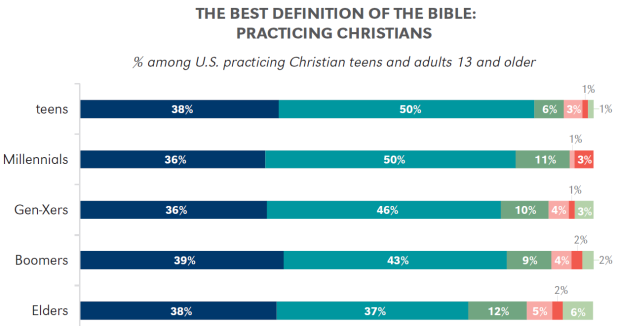
Though practicing Christian millennials are less likely than other generations to believe the Bible contains everything a person needs to know to life a meaningful life, the gap between them and their secular peers is the widest except for the teens. And they still look “much more like their older sisters and brothers in the faith than like their generational counterparts outside the church,” the report said.
Study authors explain that teens “are more similar in belief to their gen-X parents—which makes sense, as teens living at home tend to be under greater parental influence than young adults out on their own.”
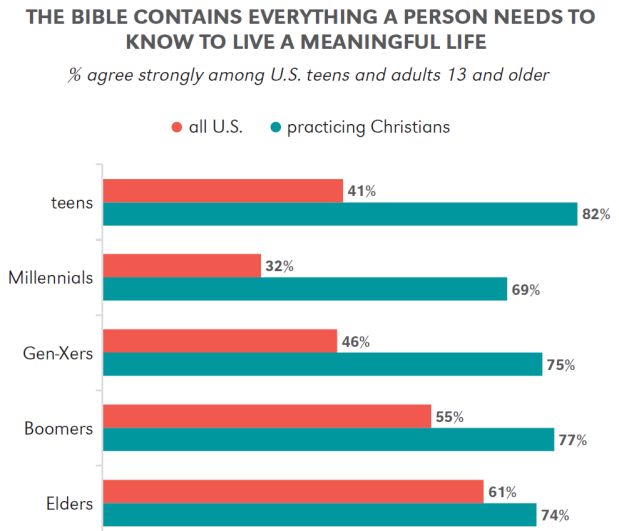
Practicing Christian millennials also know their Bibles just as well—and sometime better—than their parents and grandparents. Though Bible knowledge among non-Christian Millennials is weak—less than half can name the first five books of the Bible or know the apostle Paul’s name was Saul—Bible knowledge among Christian millennials is strong.
In fact, among practicing Christians, more millennials than elders know that the “3” in John 3:16 is the chapter, the name of Abraham’s son was Isaac, and the name of King David’s son was Solomon.
“This research challenges the assumption that younger Christians are less biblically literate than previous generations of Christians,” the report said. “For the most part, where believers maintain Bible literacy, they do so across generations.”
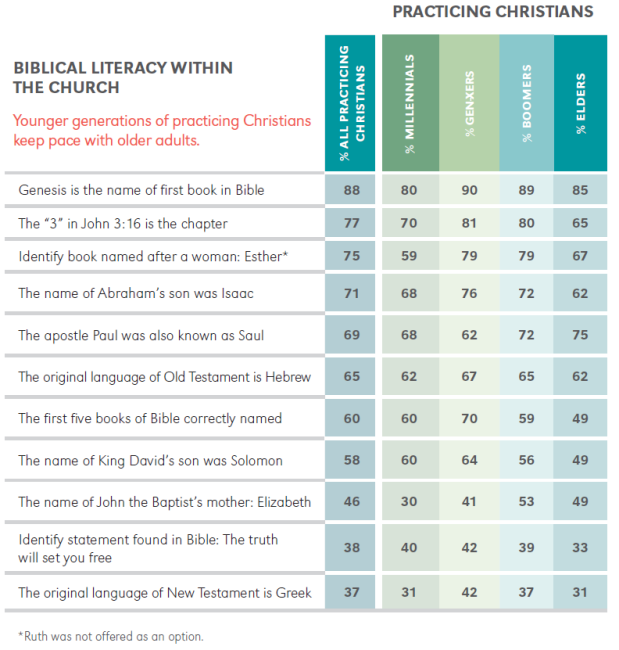
The rise of technology may be aiding millennials in staying connected to their Bibles.
Over the last 6 years, the number of those reading the Bible online has soared, up from 37 percent of all adults in 2011 to 49 percent in 2016.
Those who used their phones to search for verses or content more than doubled, from 18 percent to 43 percent. Listening to audio versions of the Bible (up from 28% to 35%) and listening to Bible teaching on podcasts (24% to 37%) also jumped dramatically.
“The growing popularity of digital technologies represents an enormous opportunity for those who seek to increase Bible engagement—especially among millennial Bible readers, who are most likely to report using digital versions of the Bible,” the report said. Among those who reported reading the Bible more last year, one in four said that increase happened because they were able to read on their phone or tablet.
Still, most prefer to turn actual pages when they read their Bible (81%), even millennials (78%).
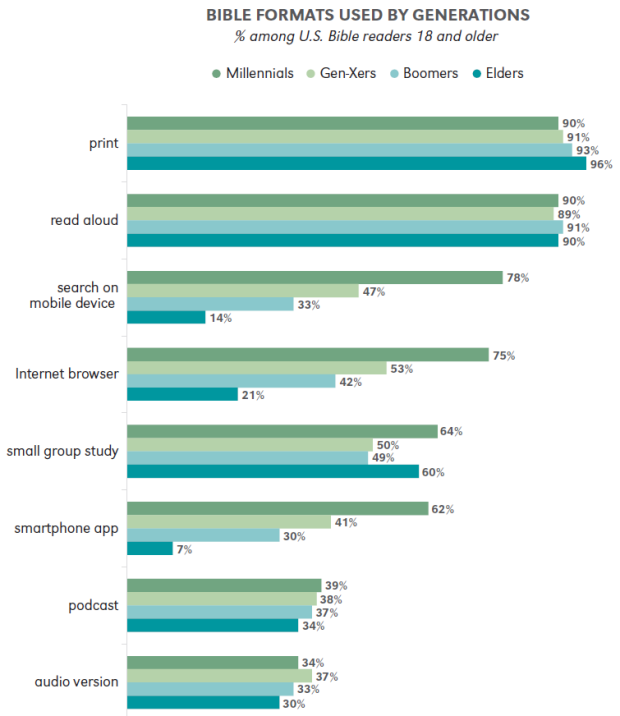
The survey also noted:
- About one-third of all adults are practicing Christians (32%).
- The percent of American households that own a Bible has remained steady (88% in 2011, 86% in 2016), and the average number of Bibles per house is also unchanged (4.5 mean in 2011, 4.6 in 2016). Americans are also reading at about the same pace—one quarter read at least a few times a week while another quarter never pick up a Bible. Everyone else falls between the two. These numbers have remained steady for the past six years.
- African Americans are more likely to believe that the Bible is the actual or inspired word of God (82%), compared to 72 percent of Hispanics and 67 percent of whites. Correspondingly, more than half of African Americans (55%) read the Bible at least once a week, more often than Hispanics (35% or whites (34%). Among practicing Christians, nearly 8 out of 10 African Americans (79%) read the Bible at least once a week, “outstripping the larger practicing Christian segment (70%),” the report said.
- Hispanic Americans are slightly more likely to believe the Bible is without error (59%) compared to the general population (54%), yet less likely to read it four times a week or more (16%, compared to 19%). The differences don’t stem from race, but from denominational affiliation, the report said. Almost 7 in 10 Hispanic Americans are Catholic (68%, compared to 19% of the general population), and those who are Protestant are just as likely (31%) to be engaged with the Bible as non-Hispanic Protestants (29%).
- The number of those who wish they read their Bible more dropped from 67 percent in 2011 to 60 percent 2012, but has held steady since (61% in 2016). The numbers for those who read in order to feel closer to God also look the same: 64 percent in 2011, dropping to 55 percent in 2012, then bouncing around before settling again at 55% in 2016.”


